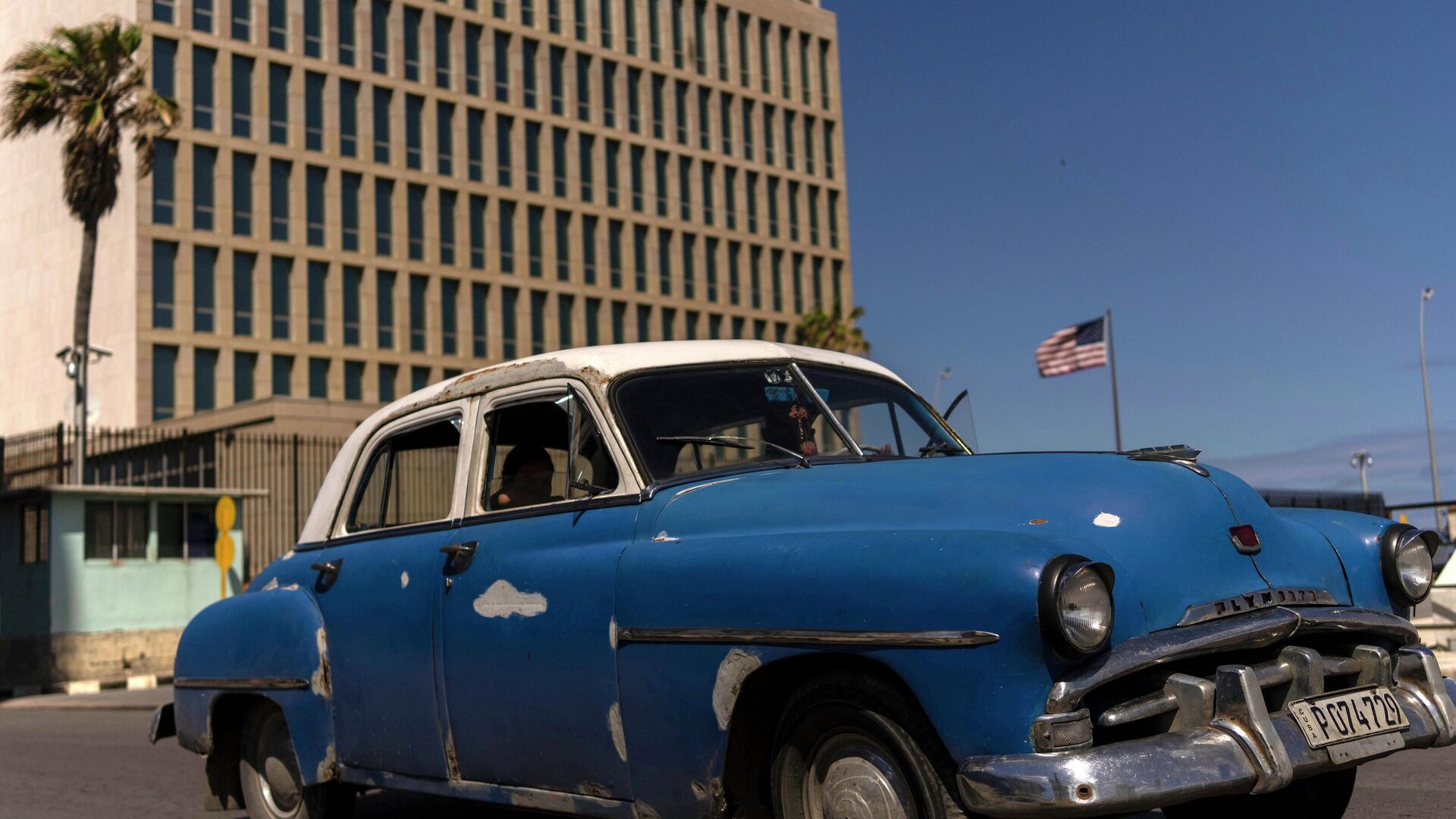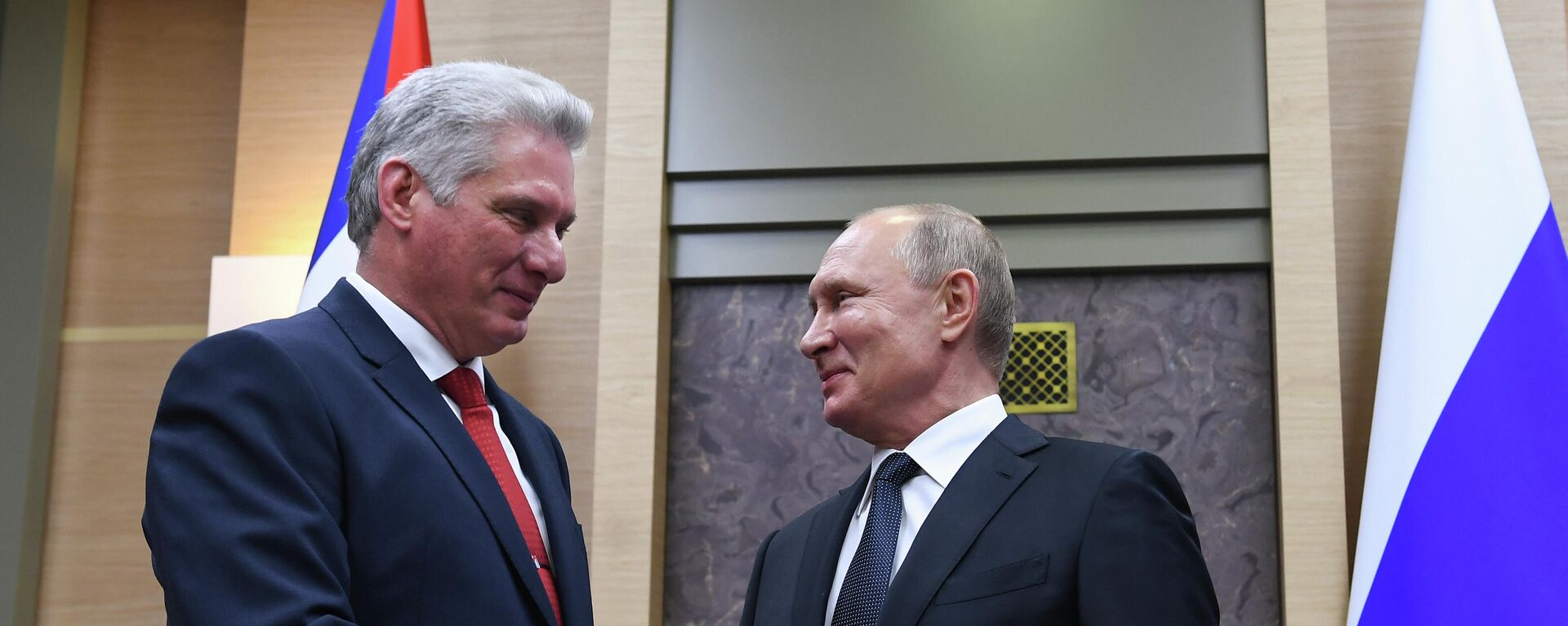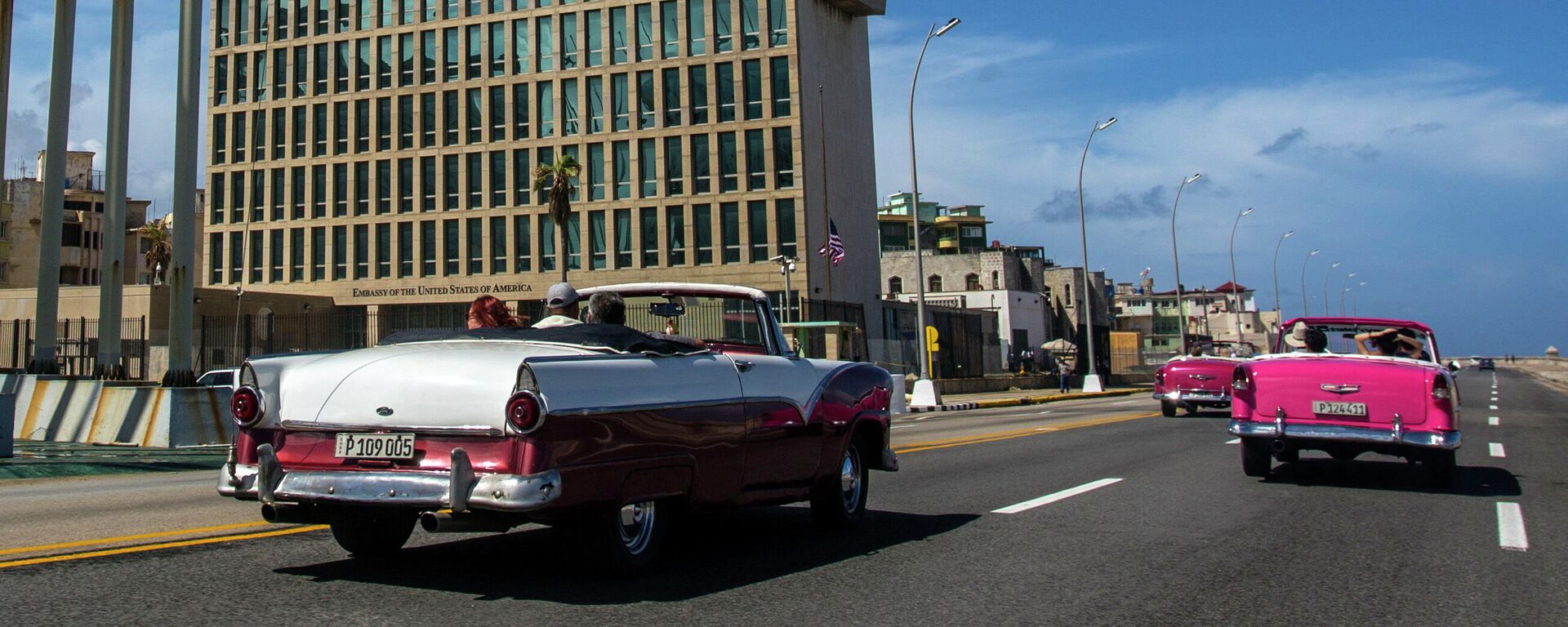https://sputnikglobe.com/20230608/totally-false-cuba-swats-down-us-media-reports-of-hosting-chinese-spy-base-1111014159.html
'Totally False': Cuba Swats Down US Media Reports of Hosting Chinese Spy Base
'Totally False': Cuba Swats Down US Media Reports of Hosting Chinese Spy Base
Sputnik International
Havana strongly rejected reports in US media on Thursday that claimed China had penned a deal worth “several billion dollars” with Cuba to place a signals intelligence base on the island, which sits 100 miles south of Florida.
2023-06-08T21:31+0000
2023-06-08T21:31+0000
2023-06-08T21:31+0000
americas
cuba
china
us national security council
signals intelligence (sigint)
base
https://cdn1.img.sputnikglobe.com/img/07e6/05/05/1095277331_0:247:3201:2048_1920x0_80_0_0_b252b74043313783ff0f1c39fd51be55.jpg
Havana strongly rejected reports in US media on Thursday that claimed China had penned a deal worth “several billion dollars” with Cuba to place a signals intelligence base on the island, which sits roughly 100 miles south of Florida.The report was based on the words of “US officials familiar with highly classified intelligence,” who claimed the intel was “convincing.”Carlos de Cossio, Cuba’s Vice-Minister of Foreign Relations, called the report "totally false and unfounded information.”“Such slanders have been fabricated by US officials apparently familiar with intelligence information, such as those regarding alleged acoustic attacks against US diplomatic personnel,” de Cossio said, referring to the mythical Havana Syndrome, which was disproven by multiple investigations, including eventually one by the US State Department.'An Imminent Threat'The fury came swiftly from Republicans, who rushed to condemn US President Joe Biden for supposedly neglecting the “threat” posed by Cuba.Earlier this year, relations began to warm ever so slightly, with the US embassy in Havana hosting several cultural exchange events with the Cuban government and relaunching its visa and consular services after a yearslong pause.US Rep. Carlos Gimenez (R-FL), a Cuban-born US lawmaker who represents the congressional district closest to Cuba, told the White House that the action “poses an imminent threat” to the United States and a “direct threat” to his constituents and to tourists in the region.He added that "Communist China is proactively undermining the United States across the Western Hemisphere and I urge this Administration to build a robust, comprehensive, and expedient strategy to counter the CCP’s [Chinese Communist Party, also CPC] malign influence with neighboring states."He urged Biden to “condemn this blatant threat to our national security interests” and to impose new sanctions, either on Cuba or China.Strategic CompetitionThe US has a military facility in Cuba at Guantanamo Bay, which it operates without Havana’s permission, and has a ring of bases surrounding China in Korea, Japan, and the Philippines, and has turned the island of Taiwan - a Chinese province in rebellion - into a pro-US garrison state. The US Navy routinely flies spy planes just miles off the Chinese coast, including signals intelligence aircraft engaged in the same kind of peeping that the alleged Cuba base would perform.Cuba was placed on the State Department’s list of state sponsors of terrorism in January 2021 as then-US President Donald Trump was preparing to leave office. The justification was a refusal by Havana to surrender leaders of the Colombian National Liberation Army (ELN) who had traveled there in good faith for peace talks with the Colombian government in 2019. When Bogota launched a new surprise attack on the ELN bases during the talks, the delegates stayed in Cuba for safety reasons.Last month, White House national security adviser Jake Sullivan told Wang Yi, the CPC’s foreign policy chief and former Chinese foreign minister, that Washington was looking to “move beyond” the balloon incident.The State Department has made no announcement about the impact of the reported Havana-Beijing deal on Blinken’s schedule.
https://sputnikglobe.com/20230521/cuba-and-russia-unveil-new-economic-deals-as-bilateral-trade-soars-1110492622.html
https://sputnikglobe.com/20230304/cuba-hits-out-at-us-for-ignoring-evidence-surrounding-havana-syndrome-1108000406.html
americas
cuba
china
Sputnik International
feedback@sputniknews.com
+74956456601
MIA „Rosiya Segodnya“
2023
News
en_EN
Sputnik International
feedback@sputniknews.com
+74956456601
MIA „Rosiya Segodnya“
Sputnik International
feedback@sputniknews.com
+74956456601
MIA „Rosiya Segodnya“
cuba; china; base; sigint; nsc; john kirby
cuba; china; base; sigint; nsc; john kirby
'Totally False': Cuba Swats Down US Media Reports of Hosting Chinese Spy Base
Ever since it overthrew a pro-US dictatorship in 1959, the US has sought to sabotage the Cuban socialist revolution, driving Havana into the arms of Moscow and more recently Beijing. The sanctions “blockade” has made everyday life on the island a struggle, with 243 new sanctions introduced in the last six years.
Havana strongly rejected reports in US media on Thursday that claimed China had penned a deal worth “several billion dollars” with Cuba to place a signals intelligence base on the island, which sits roughly 100 miles south of Florida.
The report was based on the words of “US officials familiar with highly classified intelligence,” who claimed the intel was “convincing.”
However, John Kirby, the spokesperson for the White House National Security Council, told reporters that the report was “not accurate” - words the NSC separately told two US media outlets on Thursday as well.
Carlos de Cossio, Cuba’s Vice-Minister of Foreign Relations, called the report "totally false and unfounded information.”
“Regardless of the sovereign rights that Cuba has in defense matters, our country is a signatory to the Declaration of Latin America and the Caribbean as a Zone of Peace, signed in Havana in January 2014,” he noted. “By virtue of it, we reject any foreign military presence in Latin America and the Caribbean, including that of numerous US military bases and personnel, especially in the military base that illegally occupies a portion of the national territory in the province of Guantanamo.”
“Such slanders have been fabricated by US officials apparently familiar with intelligence information, such as those regarding alleged acoustic attacks against US diplomatic personnel,” de Cossio said, referring to the mythical Havana Syndrome, which was disproven by multiple investigations, including eventually one by the US State Department.
“All are fallacies promoted with the perfidious intention of justifying the unprecedented intensification of the blockade, destabilization and aggression against Cuba and to deceive the public opinion of the United States and the world. The hostility of the United States against Cuba and the extreme and cruel measures that cause humanitarian damage and punish the Cuban people cannot be justified in any way,” de Cossio added.
The fury came swiftly from Republicans, who rushed to condemn US President Joe Biden for supposedly neglecting the “threat” posed by Cuba.
After Biden took office in 2021, he maintained the 243 coercive sanctions against Cuba that were added by his predecessor, Donald Trump, as a major reversal in policy from the rapprochement seen when Barack Obama was US president.
Following protests in the country in the summer of 2021 that were supported by the US, Biden added even more sanctions, refusing to lower them either in response to the COVID-19 crisis or when a catastrophic fire broke out at the country’s main oil offloading facility the following year.
Earlier this year, relations began to warm ever so slightly, with the US embassy in Havana hosting several cultural exchange events with the Cuban government and relaunching its visa and consular services after a yearslong pause.
US Rep. Carlos Gimenez (R-FL), a Cuban-born US lawmaker who represents the congressional district closest to Cuba, told the White House that the action “poses an imminent threat” to the United States and a “direct threat” to his constituents and to tourists in the region.
"The Castro regime in Cuba is a listed State Sponsor of Terrorism that actively pursues opportunities to undermine the United States and threaten the safety & wellbeing of our citizens. Allowing Communist China to establish a base in Cuba is only the latest example of the Castro regime’s long history of coercive, anti-American pursuits,” the letter said, which was obtained by US media.
He added that "Communist China is proactively undermining the United States across the Western Hemisphere and I urge this Administration to build a robust, comprehensive, and expedient strategy to counter the CCP’s [Chinese Communist Party, also CPC] malign influence with neighboring states."
He urged Biden to “condemn this blatant threat to our national security interests” and to impose new sanctions, either on Cuba or China.
In a separate video message also obtained by US media, Gimenez said: "It should give President Biden and Secretary Blinken you know, maybe a second thought, on maybe whether to reestablish ties with Cuba, open up dialogue with Cuba.”
The US has a military facility in Cuba at Guantanamo Bay, which it operates without Havana’s permission, and has a ring of bases surrounding China in Korea, Japan, and the Philippines, and has turned the island of Taiwan - a Chinese province in rebellion - into a pro-US garrison state. The US Navy
routinely flies spy planes just miles off the Chinese coast, including signals intelligence aircraft engaged in the same kind of peeping that the alleged Cuba base would perform.
Cuba was
placed on the State Department’s list of state sponsors of terrorism in January 2021 as then-US President Donald Trump was preparing to leave office. The justification was a refusal by Havana to surrender leaders of the Colombian National Liberation Army (ELN) who had traveled there in good faith for peace talks
with the Colombian government in 2019. When Bogota launched a new surprise attack on the ELN bases during the talks, the delegates stayed in Cuba for safety reasons.
The media leak came only a day after news that US Secretary of State Antony Blinken was rescheduling his postponed trip to Beijing.
The foreign ministry was originally slated to meet with Xi and other Chinese leaders in February, but that was put on ice after a high-altitude balloon, which Beijing said was a scientific balloon blown off course but which Washington alleged was a spying device, drifted across the United States. The US Air Force shot the balloon down and claimed it was just one airship in a vast Chinese spy balloon program.
Last month, White House national security adviser Jake Sullivan told Wang Yi, the CPC’s foreign policy chief and former Chinese foreign minister, that Washington was looking to
“move beyond” the balloon incident.
The State Department has made no announcement about the impact of the reported Havana-Beijing deal on Blinken’s schedule.






